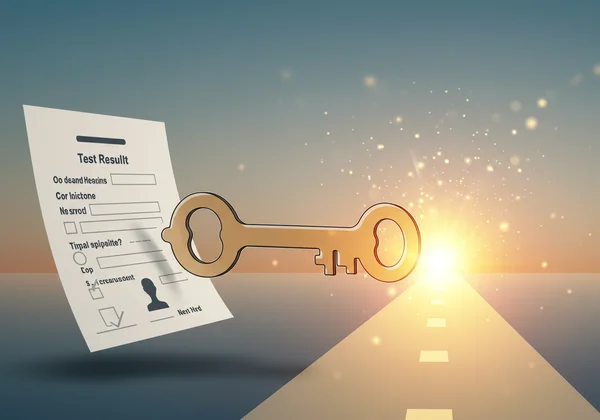双極性障害の検査結果:医師と話し合う方法
October 11, 2025 | By Leo Vance
オンラインの双極性障害スクリーニング検査を受けることは、自分の心の健康を理解するための重要かつ勇気ある一歩です。双極性障害の検査を受けた後、いくつかの初期的な洞察を得たものの、今、手元にある結果が、答えよりも多くの疑問を残しているかもしれません。もしあなたが 双極性障害検査 を完了したばかりなら、不安、混乱、そしてもしかしたら安堵感さえも入り混じった気持ちでいることでしょう。次の一歩は何だろうと考えていませんか?
この気持ちはあなただけではありません。このガイドでは、検査結果を医師との建設的で自信を持った対話に結びつける方法を、順を追ってご説明します。スクリーニング結果を終点としてではなく、会話の始まりとして、明確さを得るための貴重なツールとして考えてください。理解への道のりは、その最初の勇気ある一歩から始まることを忘れないでください。そして、[無料の双極性障害スクリーニング]を受けることは、前向きな変化のための強力な触媒となり得ます。

オンライン双極性障害テスト後の医師の診察の準備
精神的な健康について話し合うために医師の診察室に入ることは、威圧的に感じることがあります。この不安を軽減する鍵は準備です。自分の考えや経験を整理しておくことで、効果的にコミュニケーションを取り、懸念が完全に聞き入れられるようにすることができます。十分に準備された患者は、医師がより正確な評価をするのに役立ちます。
双極性障害の症状を記録する:自己評価ジャーナル
予約の前に、簡単な日記をつけ始めましょう。双極性障害の正式な診断は、多くの場合、時間の経過とともに観察されるパターンに基づいています。記憶は、特に気分の変動を思い出そうとするときに信頼できないことがあります。症状を記録することで、医師に具体的なデータを提供することができます。

以下の点を書き留めてください:
- 気分の高揚(躁病/軽躁病): いつ、異常に元気になったり、高揚したり、イライラしたりしましたか?それはどのくらい続きましたか?睡眠時間が減ったのに疲労感はありませんでしたか?衝動的な行動をとりましたか?
- 気分の落ち込み(うつ病): いつ、絶望感、悲しみを感じたり、かつて楽しんでいた活動への興味を失ったりしましたか?食欲、睡眠パターン(寝すぎたり、寝なさすぎたり)、エネルギーレベルの変化に注意してください。
- 期間と頻度: これらのサイクルはどのくらい続きますか?数日ですか?数週間ですか?数ヶ月ですか?どのくらいの頻度で発生しますか?
- 生活への影響: これらの気分の変動は、仕事、人間関係、日々の責任にどのように影響しましたか?
このジャーナルは単なるリストではありません。それはあなたの経験の物語であり、[オンライン双極性障害テスト]のスコアを超えた貴重な文脈を提供します。
家族歴を収集する:臨床医にとって重要な情報
双極性障害を含む精神疾患には、遺伝的要素がある場合があります。診察の前に、家族歴を把握しておくと役立ちます。完全な医療記録は必要ありませんが、近親者(両親、兄弟、祖父母)が双極性障害、うつ病、またはその他の気分障害と診断されたことがあるかどうかを知ることは、臨床医にとって非常に有用な情報です。
もし差し支えなければ、親族に直接尋ねてみても良いでしょう。「自分の健康履歴について調べているのですが、家族の中に気分に significant な問題を抱えていた人はいますか?」のように、やさしい言葉で尋ねてみてください。この情報は、さらに重要な手がかりとなります。
医師に尋ねるべき質問:診察をより有意義にするために
あなたの診察は双方向の会話です。医師に尋ねる質問のリストを準備しておくことで、必要な情報を得て診察を終えることができます。これは、あなたが自分のヘルスケアに積極的に参加していることを示します。
以下の質問を検討してください:
- 私の症状に基づいて、考えられる説明は何ですか?
- 双極性障害の詳しい評価は、どのように進められるのでしょうか?
- 私の症状は他の医学的状態に関連している可能性がありますか?
- 双極性I型、双極性II型、および他の気分障害の違いは何ですか?
- 診断が下された場合、一般的な次のステップや治療選択肢は何ですか?
効果的なコミュニケーション:双極性障害の検査結果について話し合う
準備が整ったら、次の一歩は会話そのものです。目標は、オープンに、正直に、そして明確に話すことです。医師はこのプロセスにおけるあなたのパートナーであり、効果的なコミュニケーションは、必要な助けを得るための架け橋となります。
オンライン検査結果と受診理由を説明する
まず、診察のきっかけとなったことを説明することから始めましょう。例えば、「ひどい気分の変動について心配だったので、オンラインスクリーニングを受けました。 双極性障害検査 の結果、この状態の兆候があるかもしれないと示されたので、専門家と相談したかったのです」と言うことができます。
このアプローチは、検査の役割を正しく捉えています。つまり、専門家のアドバイスを求めるきっかけとなったスクリーニングツールであるということです。これは、あなたが自分の健康について積極的であることを示しています。無料の双極性障害スクリーニングテスト のようなツールを使用したことを伝えることで、医師は議論の明確な出発点を得ることができます。
経験を明確に説明する:検査結果を超えて
ここで、あなたの症状ジャーナルが非常に貴重になります。「気分が変動します」と言う代わりに、メモを使って具体的な例を挙げてください。例えば、「先月は、1週間、夜に3時間しか寝ていないのに信じられないほど元気で、一度に3つの大きなプロジェクトを始めました。その後の2週間は、ベッドからほとんど起き上がれず、全く価値がないと感じました」といった具合です。
あなたの経験を明確かつ詳細に説明することで、医師に鮮明なイメージを伝えることができます。「私は」という言葉を使って、あなたの個人的な経験と、これらの症状があなたの生活に具体的にどのように影響しているかに焦点を当ててください。
スティグマに対処し、非判断的な空間を求める
判断されたり、誤解されたりすることを恐れるのはごく自然なことです。精神疾患に対するスティグマは、多くの人にとって現実の懸念です。不安を感じている場合は、それを口にしても大丈夫です。医師に「このことを話すのは難しいですし、判断されるのではないかと心配しています」と伝えることができます。
良い医療専門家は、安心感を与え、あなたの会話のために安心できる、偏見のない空間を作り出してくれるでしょう。彼らの主な目標はあなたを助けることであることを忘れないでください。あなたの脆弱さは、弱さではなく強さの証です。

次のステップを理解する:双極性障害の医師の診察後
最初の診察は、しばしばプロセス全体の始まりです。次に何が起こるかについて現実的な期待を持つことが重要です。診断は1回の診察で下されることは稀であり、医師は今後の計画を提示するでしょう。
専門的な精神衛生評価中に期待されること
医師が気分障害を疑う場合、専門的な精神衛生評価を勧める可能性が高いです。これは、オンラインの双極性障害自己検査よりもはるかに詳細で包括的な評価です。通常、以下が含まれます:
- 詳細な面談: 臨床医(多くの場合、精神科医または心理学者)が、あなたの症状、個人的な履歴、家族歴について詳細な質問をします。
- 心理学的質問票: より詳細な標準化された質問票に記入するよう求められることがあります。
- 他の原因の除外: 医師は、甲状腺の問題など、あなたの症状が他の医学的問題によって引き起こされていないことを確認するために、血液検査や身体検査を指示することがあります。
潜在的な診断と治療の議論を進める
評価後、医療提供者はあなたと検査結果について話し合います。これにより、正式な診断に至る場合があります。双極性障害と診断された場合、会話は治療選択肢へと移ります。これは共同での話し合いです。治療には、多くの場合、薬物療法(気分安定薬など)と心理療法(認知行動療法など)の組み合わせが含まれます。治療の目標は、症状を管理し、安定した充実した生活を送るのを助けることであることを忘れないでください。
なぜ双極性障害の検査結果は診断ではなく、あくまで出発点なのか
いくら強調しても足りないことですが、オンラインスクリーニングツールは出発点であり、診断ではありません。 Bipolar Disorder Test free のようなスクリーニングツールは、気分障害質問票(MDQ)のような確立された精神医学的質問票に基づいて、パターンと潜在的なリスク要因を特定するように設計されています。これらは、意識を高め、人々が助けを求めることを促す上で非常に価値があります。
しかし、包括的な評価の後で決定的な診断を提供できるのは、資格のある医療専門家だけです。あなたの検査結果を、専門家との会話の扉を開く鍵として見てください。

あなたの旅を力づける:双極性障害検査結果について話し合った後の次のステップ
あなたはすでに、情報を求め、医師と話す準備をすることで、非常に重要な一歩を踏み出しました。この先の旅は、知識を得て、明確さを見つけ、最終的にあなたの幸福をよりコントロールすることにあります。あなたの考えを準備し、経験を記録し、オープンにコミュニケーションをとることで、あなた自身とあなたの医師が効果的に協力できるようになります。
この会話は、あなたの精神的な健康の旅における極めて重要な瞬間です。それは不確実性と明確な前進の道との間の架け橋です。気分のパターンを疑問に思い始めたばかりであろうと、何かがおかしいと長い間疑っていたであろうと、今こそ行動を起こす時です。今すぐ秘密のスクリーニング を開始し、理解とより健康な未来への自信ある一歩を踏み出しましょう。
双極性障害と医師の診察に関するよくある質問
医師はどのように双極性障害を正式に診断しますか?
医師は、包括的な精神衛生評価を通じて双極性障害を診断します。これには、症状、その期間と重症度、およびそれがあなたの生活にどのように影響するかについての詳細な議論が含まれます。彼らはあなたの経験を「精神疾患の診断・統計マニュアル(DSM-5)」に記載されている基準と比較します。これは臨床評価であり、単純な検査ではありません。
双極性障害の診断に特化した検査はありますか?
いいえ、双極性障害に対する単一の血液検査、脳スキャン、または身体検査はありません。診断は、症状、個人的な履歴、家族歴の徹底的な評価に基づいて、精神衛生専門家によって行われます。医学的検査が使用されることもありますが、その目的は、同様の症状を引き起こしている可能性のある他の状態を除外することです。
双極性障害の専門的な検査はどこで受けられますか?
かかりつけ医(PCP)または一般開業医(GP)から始めるのが良いでしょう。彼らは初期評価を行い、精神科医や心理学者などの精神衛生専門家を紹介して、完全な評価を受けることができます。精神科医は、状態を診断し、薬を処方できる医師です。オンラインの双極性障害スクリーニング を受けることで、最初の診察で共有できる要約を得ることができます。
双極性障害を治療せずに放置すると、どうなりますか?
未治療のまま放置された場合、双極性障害の症状は時間の経過とともに悪化し、より頻繁で重度の気分エピソードにつながる可能性があります。これにより、人間関係、仕事や学校の成績、全体的な生活の質に重大な支障をきたす可能性があります。専門的な評価と治療を求めることが、この状態を管理し、長期的な合併症を防ぐための最も効果的な方法です。
免責事項:この記事は情報提供のみを目的としており、医学的なアドバイスに代わるものではありません。内容は専門的な医学的アドバイス、診断、または治療の代わりとなることを意図したものではありません。病状に関してご質問がある場合は、常に医師またはその他の資格のある医療提供者のアドバイスを求めてください。BipolarDisorderTest.org のオンラインスクリーニングツールは、教育的および予備的な自己評価を目的としたものであり、診断ツールではありません。